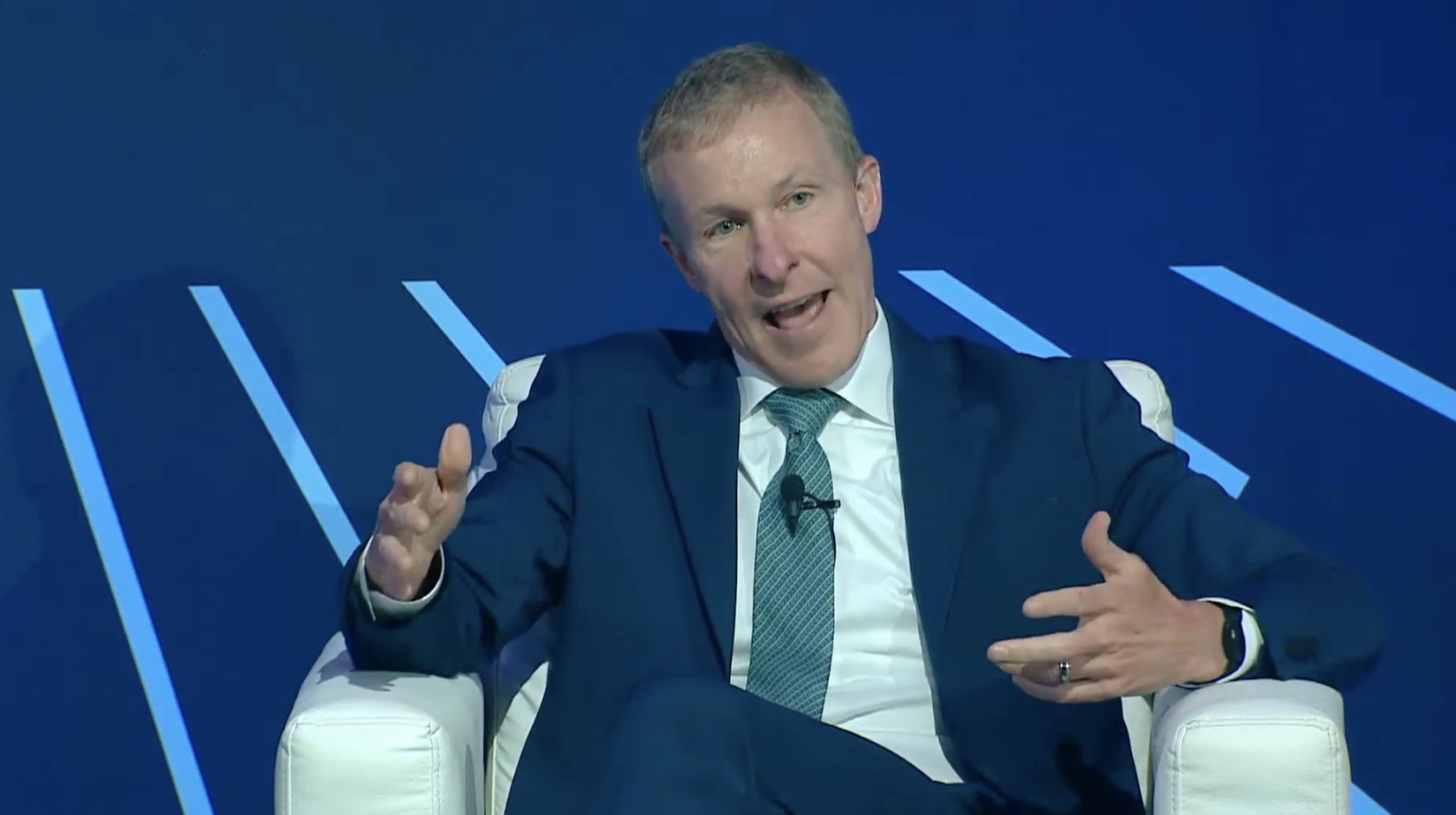
United Airlines CEO Scott Kirby is convinced that a Department of Transportation probe into the frequent flyer programs of US airlines will reveal that customers are happy with the programs and redemptions. Kirby also warned that the bipartisan Credit Card Competition Act would destroy loyalty programs for US consumers.
United CEO Is Not Worried About DOT Frequent Flyer Probe, But Is Concerned About Credit Card Competition Act
Kirby appeared this week at the third annual Global Aerospace Summit hosted by the US Chamber of Commerce and Airbus in Washington, DC on September 11, 2024.
He appeared in a five-minute on-stage interview with Washington Post aviation reporter Lori Aratani. First, he was asked what is motivating the recent Department of Transportation probe into frequent miles and whether there is any merit to that inquiry. His answer focused on the value he claims consumers find in airline loyalty programs:
“I 100% agree with the Secretary on loyalty programs. He said in his press release that consumers love them. That is absolutely true. This summer, over 3 million people flew on a free flight on United Airlines using the Mileage Plus program. That, just for some context, is about 1% of the entire U.S. population, on just one airline, in just one season. So customers love these programs…We’ve known that – that’s why we keep trying to make them better.”
The redemption numbers are impressive and help to explain why United MileagePlus recently was ranked as the world’s third-best frequent flyer program. But redemptions do not necessarily reflect value or whether “bait and switch” through rapid redemption pricing inflation took place. I’ll save that discussion for another time, but volume does not equal satisfaction.
Kirby views the bipartisan Credit Card Competition Act as a death knell to frequent flyer programs:
“The one risk to these programs are legislative initiatives that I’m sure are well-intentioned but would just be bad policy, particularly the Credit Card Competition Act, which would help big retailers but 84% of US consumers have a rewards card in their wallet and as the Secretary said, they love these programs, they love getting those three million miles to travel all over the world, and that act, if it passed, would eliminate that ability to earn miles for all those people.”
As I’ve argued before, The Credit Card Competition Act would undeniably undermine consumer credit card rewards. Capping fees through forced competition would make it impossible to continue to offer the current portfolio of benefits on many card products.
I get the argument that people paying with cash and debit cards are effectively subsidizing folks like you and me who use credit cards (apparently 84% of the country, per Kirby), but consumers would not see any savings if this bill passes. Instead, retailers would likely just keep these savings, passing nothing on to consumers. I’m not in favor of that…if retailers want to offer a cash discount already, they can certainly do so…
In any case, Kirby opposes the Credit Card Competition Act because it would spell the end of the MileagePlus cash cow and greatly reduce the value of the relationship for United’s true best customer, Chase Bank. I oppose it because I think consumers, both rich and poor, would lose, with only retailers benefiting.
> Read More:The Points Guys Turns Political…
When pressed, Kirby made the same argument again…stressing that the DOT probe presents the perfect case to show how frequent flyer programs are just fine in their current form.
“This is a great opportunity to make everyone realize and appreciate how much consumers love those programs and we should all protect them.”
But why? What makes them valuable?
“I think the evidence speaks for itself.
“The fact that you had three million people travel this summer on the program…the fact that 84% of US consumers have those rewards cards in their wallet demonstrates that people want these programs, love these programs, and value these programs.
“The affinity that loyal people have for these programs is incredible. We know how valuable it is and all the evidence will show that we all appreciate the value and we should protect and should avoid legislative changes that jeopardize these programs.”
That is the mantra: people must be happy because they are redeeming so many miles and signing up for so many credit cards.
Are you convinced by that argument?
You can watch Kirby’s full remarks below.
image: US Chamber of Commerce (screengrab)




Kirby: The things I want are good; The things I don’t want are bad.
Major surprise.
I can’t really comment intelligently and in an unbiased fashion on this because I have only one airline credit card in my wallet. It’s a United Club Infinite Card. I also bank with Chase. I’ve got that card and pay the hefty fee because I spent a lot of time in airports and I want United Club access and Star Alliance Gold privileges. It also helps me with trying to keep my 1K. I would be heartbroken if my preferred airline and my preferred bank had to chop the legs off this card, but I’ll live.
Right…we’ll survive, but I really don’t think consumers…rich or poor…would be helped. Just big-box retailers.
And I’m quite happy that these retailers also are not slapping on 3-5% surcharges on everything when paying with card, like in AUS/NZ.
“Instead, retailers would likely just keep these savings, passing nothing on to consumers. I’m not in favor of that…if retailers want to offer a cash discount already, they can certainly do so…”
Logically businesses should mostly pass on savings to consumers just as they pass on costs. If jetfuel prices were to be reduced, would all airline fares stay at the same rate? Provided there is competition in place, the prices will go down which segues to…
I heard that some credit card agreements with merchants require they not charge a higher rate to credit card users than their cash customers (but that practice may have been banned). In any case, such disclosures that a merchant will charge a higher rate to credit card customers can sour relations with them hence they don’t offer to do so out of fear of alienating their majority user base.
Kirby is complaining, quite frankly, because he has a good thing going and can afford to do what governments do: engage in inflationary behavior as a backdoor tax: Just devalue the miles from time to time and consumers will whine but get on with their lives. Will they go from store to store asking for cash discounts?
Not only that, but the fine print of the agreements usually include an Eff-You provision: They can devalue the points at any time, kick you out for fun, and if you don’t like it, go to forced arbitration where you pay for everything. Sort of like how clicking on the user agreement for Disney Plus means you can’t sue them in court if they kill your spouse at one of their theme parks.
Maybe the frequency of UA redemptions is increasing because UA miles are not worth saving for an aspirational trip anymore. Most people travel infrequently so have few miles -> redeem as soon as they can on some cheap domestic option. People who used to save miles for an aspirational trip -> redeem as soon as they can now before they get devalued away.
“United Airlines CEO Scott Kirby is convinced that a Department of Transportation probe into the frequent flyer programs of US airlines will reveal that customers are happy with the programs and redemptions.”
I think he may be confusing “begrudgingly satisfied” for “happy”…I’d say customers are probably not as happy as they were a decade ago.
Good because they don’t like it when people talk about them devaluing points ! But they like to say how their credit card rewards are a great benefit to consumers. This review will expose them for what they truly are sometimes scammers and the big box retailers going to run with it.
@Matthew, nobody is asking me, nor probably any of our readers, but you might be able to amplify that MP devaluations are bad.
You can be heard by the DOT and maybe (I am not holding my breath) affect change get some of the devaluations reversed.
Uh, probably a pipe dream.
Would love too. The issue to me is not the devaluations but the lack of notice.
I don’t think it would ruin FFPs to require notice.
The promises that the airlines made at the time you earned the miles, these promises were a fraud if they now devalue those miles – with or without notice. Obviously you Matthew have a vested interest in not saying so, but these days the value proposition of a loyalty program is a gigantic swindle. Thank heavens someone in the govt wants to do something about it.
Same applies to interchange fees, you’re always going to say they’re not a problem. But of course they are a problem, an unannounced uncapped swindle on anyone/everyone making a payment.
People can afford it, companies won’t adjust prices, and other really weak excuses, doesn’t cut it
Of course he’s not worried. He’s pretty tight with the current administration for a reason.
It’s no different than a Japanese Gacha game. For online gamers the equivalent is a Loot Box. You can wiki them,
In some countries they have been made illegal as it relates to gambling and addiction. These games bait people for the elusive rainbow without transparency, clear paths, and do it by offering lesser prices of value to keep you pulling the handle over and over to maybe, eventually, one day…win the unicorn.
Either the airlines offer “this for that” specially at set pricing and with clear standards of availability – and are made to give proper notice of devaluations – or this “game” is nothing more than a Casino with bad odds that lures consumers with scenes of distant beaches and Champagne – shrouding the bitter truth that far more often it’s an economy ticket to Peoria.